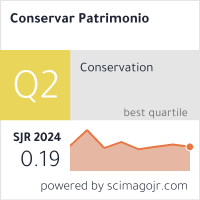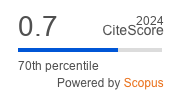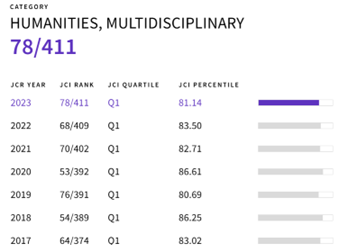Identificação dos materiais usados na tampa de um sarcófago de madeira com estrutura compósita do período Ptolemaico do Egipto
DOI:
https://doi.org/10.14568/cp2017029Palavras-chave:
Sarcófago de madeira, Abusir El-Meleq, Período Ptolemaico, Museu Egípcio do Cairo, Pigmentos, AglutinanteResumo
A tampa de um sarcófago de madeira, de proveniência desconhecida, com camadas de preparação e cromática e têxteis antigos, foi encontrada na cave do Museu Egípcio, no Cairo (JE 36806). A informação obtida permitiu a concluir que a tampa remonta ao período Ptolemaico do Egipto (332-30 a. C.), enquanto o têxtil não pertence à tampa. Para avaliar a deterioração e a estrutura da tampa do sarcófago e perceber como foi feita na oficina da necrópole, foi usada radiografia de raios X, fotografia, microscopia óptica, microscopia USB de luz reflectida, espectroscopia de infravermelho com transformada de Fourier com reflexão total atenuada (FTIR-ATR), espectroscopia de raios X dispersiva de energia (EDX), difracção de raios X (XRD) e espectroscopia de Raman.
Recebido: 2017-6-2
Revisto: 2017-10-29
Aceite: 2017-11-30
Online: 2018-2-1
Publicação: 2018-9-29
Downloads
Referências
[1] Rubensohn, O., 'Bericht über die Ausgrabungen bei Abusir el Mäläq im Jahre 1903', Zeitschrift für Ägyptische Sprache und Altertumskunde 41-42 (1904) 1-21.
[2] Bard, K (ed.), Encyclopedia of the Archaeology of Ancient Egypt, Routledge, London - New York (1999).
[3] Germer, R.; Kischkewitz, H.; Lüning, M., Berliner Mumiengeschichten: Ergebnisse Eines Multidisziplinaren Forschungsprojektes, Schnell und Steiner, Regensburg (2009).
[4] Bruyère, B., Rapport sur les Fouilles de Deir el Médineh (1928), Institut Français d'Archéologie Orientale, Le Caire (1929) 42-43.
[5] El-Enany, K., 'Un carré de lin peint au musée de l'Agriculture du Caire (inv. 893)', Bulletin de l'Institut Français d'Archéologie Orientale 110 (2010) 35-45.
[6] Valdemar, S., Sarkofager, Mumiekister og Mumiehylstre i det Gamle Aegypten, J. Frimodt, København (1919).
[7] Dawson, J.; Marchant, J.; Von Aderkas, E.; Cartwright, C.; Stacey, R., 'Egyptian coffins: materials, construction and decoration', in Death on the Nile Uncovering the Afterlife of Ancient Egypt, ed. H. Strudwick & J. Dawson, Fitzwilliam Museum, Cambridge (2016) 75-111.
[8] Wheeler, E. A.; Baas, P.; Gasson, P. E. (ed.), ''IAWA List of microscopic features for hardwood identification: with an appendix on non-anatomical information', IAWA Bulletin 10(3) (1989) 219-332, https://doi.org/10.1163/22941932-90000496.
[9] Anelkovic, B.; Victoria, M.; Amoros, A., 'The coffin of Nesmin: construction and wood identification', Journal of the Serbian Archaeological Society 21 (2005) 349-364.
[10] Schweingruber, F.H.; Börner, A.; Schulze, E., Atlas of Stem Anatomy in Herbs, Shrubs and Trees, Springer, Berlin - Heidelberg (2011).
[11] Crivellaro, A. ; Schweingruber, F. H., Atlas of Wood, Bark and Pith Anatomy of Eastern Mediterranean Trees and Shrubs with a Special Focus on Cyprus, Springer, Berlin -Heidelberg (2013).
[12] Gale, R.; Gasson, P.; Hepper, N.; Killen, G., 'Wood', in Ancient Egyptian materials and technology , ed. P. Nicholson & I. Show, Cambridge University Press, Cambridge (2000) 334-370.
[13] Gansicke, S., 'The conservation of decorated organic Egyptian surfaces: a literature review', in Decorated Surfaces on Ancient Egyptian Objects: Technology, Deterioration and Conservation, ed. J. Dawson, C. Rozeik & M. Wright, Archetype Publications, Cambridge (2010) 67-77.
[14] Stein, A.; Lacovara, P., 'Observations on the preparation layers found on ancient Egyptian decorated coffins', in Decorated Surfaces on Ancient Egyptian Objects: Technology, Deterioration and Conservation, ed. J. Dawson, C. Rozeik & M. Wright, Archetype Publications, Cambridge (2010) 3-8.
[15] Sadegh, A.; Kiaei, M.; Samariha, A., 'Experimental Characterization of Shrinkage And Density of Tamarix Aphylla Wood', Cellulose Chemistry and Technology 46 (2012) 369-373.
[16] Mecklenburg, M. F.; Tumosa, C. S.; Erhardt, D., 'Structural response of painted wood surfaces to changes in ambient relative humidity', in Painted Wood: History and Conservation, ed. V. Dorge & C. Howlett, Getty Conservation Institute, Los Angeles (1998) 464.
[17] Killen, G., Ancient Egyptian Furniture, vol.1, Oxbow Books, Oxford (2017) 7.
[18] Derrick , M.; Stulik, C. Landry, J., Infrared Spectroscopy in Conservation Science, Getty Publications, Los Angeles (1999) 179-183.
[19] Lucas, A.; Harris, J.R., Ancient Egyptian Materials and Industries, 4th ed., Edward Arnold, London (1962).
[20] Scott, D. A.; Warmlander, S.; Mazurek, J.; Quirke, S., 'Examination of some pigments, grounds and media from Egyptian cartonnage fragments in the Petrie Museum- University College London', Journal of Archaeological Science, 36 (3) (2009) 923-932, https://doi.org/10.1016/j.jas.2008.12.011.
[21] Mahmoud, H., 'A multi-analytical approach for characterizing pigments from the tomb of Djehutyemhab (Tt194), Elqurna necropolis, Upper Egypt', Archeometriai Mhely 3 (2012) 205-214.
[22] Mahmoud, H. H. M., 'Investigations by Raman microscopy, SEM and FTIR-ATR of wall paintings from Qasr el-Ghuieta temple, Kharga Oasis, Egypt', Heritage Science 2 (2014) 18. https://doi.org/10.1186/s40494-014-0018-x.
[23] Westlake, P.; Siozos, P.; Philippidis, A.; Apostolaki, C.; Derham, B.; Terlixi, A.; Perdikatsis, V.; Jones, R. ; Anglos, D. , 'Studying pigments on painted plaster in Minoan, Roman and early Byzantine Crete. A multi-analytical technique approach', Analytical and Bioanalytical Chemistry 402(4) (2012) 1413-1432, https://doi.org/10.1007/s00216-011-5281-z.
[24] Lee, L.; Quirke, S., 'Painting materials', in Ancient Egyptian Materials and Technology, ed. P. Nicholson & I. Show, Cambridge University Press, Cambridge (2000) 104-119.
[25] Scott, D. 'A review of ancient Egyptian pigments and cosmetics', Studies in Conservation 61(4) (2016) 185-202, http://dx.doi.org/10.1179/2047058414Y.0000000162.
[26] Jaksch, H.; Seipel, W.; Weiner, K.; E1 Goresy, A., 'Egyptian blue - Cuprorivaite a window to ancient Egyptian technology', Naturwissenschaften 70(11) (1983) 525-535, https://doi.org/10.1007/BF00376668.
[27] Bianchetti, P.; Talarico, F.; Vigliano, M. G.; Ali, M. F., 'Production and characterization of Egyptian blue and Egyptian green frit', Journal of Cultural Heritage 1(2) (2000) 179-188, https://doi.org/10.1016/S1296-2074(00)00165-5.
[28] Hatton, G. D.; Shortland, A. J.; Tite, M. S., 'The production technology of Egyptian blue and green frits from second millennium BC Egypt and Mesopotamia', Journal of Archaeological Science 35(6) (2008) 1591-1604, https://doi.org/10.1016/j.jas.2007.11.008.
[29] Di Stefano, L.M.; Fuchs, R., 'Characterization of the pigments in a Ptolemaic Egyptian Book of the Dead papyrus', Archaeological and Anthropological Sciences 3 (2011) 229-244, https://doi.org/10.1007/s12520-011-0054-3.
[30] Ambers, J., 'Raman analysis of pigments from the Egyptian Old Kingdom', Journal of Raman Spectroscopy 35 (8-9) (2004) 768-773, https://doi.org/10.1002/jrs.1187.
[31] Bersani, D.; Lottici, P. P., 'Raman spectroscopy of minerals and mineral pigments in archaeometry', Journal of Raman Spectroscopy 47(5) (2016) 499-530, https://doi.org/10.1002/jrs.4914.
[32] Burgio, L.; Clark , R., 'Library of FT-Raman spectra of pigments, minerals, pigment media and varnishes, and supplement to existing library of Raman spectra of pigments with visible excitation', Spectrochimica Acta Part A 57(7) (2001) 1491-1521, https://doi.org/10.1016/S1386-1425(00)00495-9.
[33] David, A.; Edwards, H.; Farwell, W.; De Faria, D., 'Raman spectroscopic analysis of ancient Egyptian pigments', Archaeometry 43(4) (2001) 461-473, https://doi.org/10.1111/1475-4754.00029.
[34] Hanesch, M., 'Raman spectroscopy of iron oxides and (oxy) hydroxides at low laser power and possible applications in environmental magnetic studies', Geophysical Journal International 177(3) (2009) 941-948, https://doi.org/10.1111/j.1365-246X.2009.04122.x.
[35] Abdrabou, A.; Abdallah, M.; Kamal, H., 'Scientific investigation by technical photography, OM, ESEM, XRF, XRD and FTIR of an ancient Egyptian polychrome wooden coffin', Conservar Património 26 (2017) 51-63, https://doi.org/10.14568/cp2017008.
[36] Ragai, J., 'Colour: its significance and production in Ancient Egypt', Endeavour 10 (2) (1986) 74-79, https://doi.org/10.1016/0160-9327(86)90134-1.
[37] Vahur, S.; Teearu, A.; Peets, P.; Joosu, L.; Leito, I., 'ATR-FT-IR spectral collection of conservation materials in the extended region of 4000-80 cm-1', Analytical and Bioanalytical Chemistry 408 (13) (2016) 3373-3379, https://doi.org/10.1007/s00216-016-9411-5.
[38] 'ATR-FT-IR spectra of egg yolk (4000-225 cm-1)', in Database of ATR-FT-IR Spectra of Various Materials, http://lisa.chem.ut.ee/IR_spectra/paint/binders/egg-yolk/ (accessed 2017-1-31).
[39] Vandenabeele, P. ; Wehling, B.; Moens, L.; Edwards, H.; De Reu, M.; Van Hooydonk, G., 'Analysis with micro-Raman spectroscopy of natural organic binding media and varnishes used in art', Analy ica Chimica Acta 407(1-2) (2000) 261-274, https://doi.org/10.1016/S0003-2670(99)00827-2.
[40] Nevin, A.; Osticioli, I. ; Anglos, D.; Burnstock, A.; Cather, S.; Castellucci, E., 'The analysis of naturally and artificially aged protein-based paint media using Raman spectroscopy combined with Principal Component Analysis', Journal of Raman Spectroscopy 39(8) (2008) 993-1000, https://doi.org/10.1002/jrs.1951.
[41] Osticioli, I.; Nevin, A.; Anglos, D.; Burnstock, A.; Cather, S.; Becucci, M.; Fotakis, C.; Castellucci, E., 'Micro-Raman and fluorescence spectroscopy for the assessment of the effects of the exposure to light on films of egg white and egg yolk', Journal of Raman Spectroscopy 39(2) (2008) 307-313, https://doi.org/10.1002/jrs.1915.
[42] Newman, R. ; Serpico, M., 'Adhesives and binders', in Ancient Egyptian Materials and Technology, ed. P. Nicholson & I. Show, Cambridge University Press, Cambridge (2000) 475-490.
[43] Vogelsang-Eastwood, G., 'Textiles', in Ancient Egyptian Materials and Technology, ed. P. Nicholson & I. Show, Cambridge University Press, Cambridge (2000) 268-297.
[44] Borojevic, K.; Mountain, R., 'Microscopic identification and sourcing of ancient Egyptian plant fibres using longitudinal thin sectioning', Archaeometry, 55(1) (2013) 81-112, https://doi.org/10.1111/j.1475-4754.2012.00673.x.

Downloads
Publicado
Como Citar
Edição
Secção
Categorias
Licença
O presente trabalho é distribuído nos termos da Licença Creative Commons (CC BY-NC 4.0) que permite a utilização, partilha e reprodução para fins não comerciais e sem modificações, desde que o autor e fonte original sejam citados.
O Copyright permanece com os autores.






